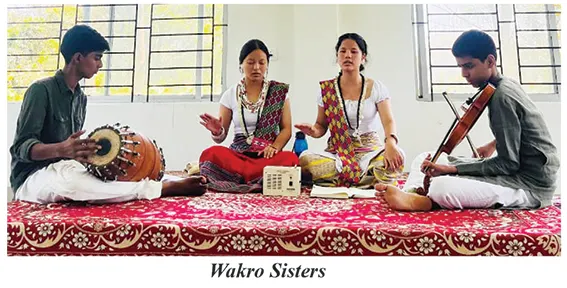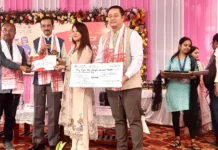Monday Musing
[ Karyir Riba ]
Arunachal Pradesh has produced many a talent in various fields, be it sports or art. Many artists have represented the state even in programmes that air on national television, as well as on other platforms, making us all proud and bringing laurels to the state.
Behelti Ama and Ashapmai Dellang are two such emerging names that have showcased their talent in something which is so unique to the state. Better known as the Wakro Sisters, Ama and Dellang are Carnatic musicians, or, as they like to put it, students of Carnatic music, because they are still learning.
The very first public performance of Carnatic music in Arunachal was presented by the Wakro Sisters in May at different venues in Tezu, Namsai and Itanagar. They performed along with two young instrumental prodigies from Kerala – Devanarayan with violin and Sreehari Bhattathiripad with the mridangam – and presented different genres of Carnatic kritis.
Let us know more about the Wakro Sisters and about what Carnatic music actually is.
Both Ama (22) and Dellang (21) come from Wakro circle of Lohit district. After completing their higher secondary schooling from BASSS Chennai, they joined the RDCFA Kalakshetra, Chennai for further studies. Dellang is a full-time student of Carnatic music for the last five years and is pursuing a diploma in Carnatic vocal music, while Ama is pursuing her diploma in fine arts and pursues Carnatic music as a hobby.
It is important to mention here that they are the first students from Arunachal to have taken up Carnatic music studies in the last 25 years.
Ama and Dellang have both sung kritis in Telugu, Sanskrit, Tamil and Malayalam languages, not only in their public performances, but also over All India Radio (Tezu, Itanagar, Dibrugarh) and Doordarshan (Itanagar, Dibrugarh). Their love, devotion and commitment towards Carnatic music have brought them accolades from lovers of the music and maestros across the country like Prince Rama Varma, Vid Amrutha Venkatesh and Dr OS Arun. They have also received appreciation from Prime Minister Narendra Modi, as well as from Chief Minister Pema Khandu.
Locally, they have received appreciation from the Cultural and Literary Society of Mishmi, and have also been presented with the title of ‘Trend Setter’ from the Lohit unit of the Arunachal Artist Forum.
So far, the duo has conducted public programmes at the community convention centre in Tezu, Shiksha Valley School in Dibrugarh at the Dibrugarh University, and Rajiv Gandhi University in Doimukh, besides in Namsai, Hayuliyang, and at the RKM Hospital auditorium in Itanagar.
Individually too, both these talented girls have quite a number of achievements under their belts.
Dellang was awarded the Bhajan Award by a Thiruvananthapuram (Kerala)-based patron.
Ama, who doubles as a fine arts student, has conducted art workshops at Bamboosa Library, Tezu,and at VKV Sunpura. She has also exhibited her artwork in Tezu, Roing, Dibrugarh, Chennai, FINEXT mini art exhibition, and in Delhi too.
They have both been attached with the Lohit Youth Library Network as volunteers for a decade now.
Here are excerpts from an interview with the Wakro Sisters:
AT: What is Carnatic music?
WS: Carnatic is south Indian classical music. It is a traditional music that has been in practice for 500 years. It is an orally transmitted system which follows the raga system of music. The compositionsare composed in different languages, like Samakritam, Hindi, Tamil, Malayalam, Telugu, and a few in Kannada.
AT: Did you face any hardship in your journey as Carnatic musicians?
WS: In the beginning, we faced difficulties mainly in understanding the different languages, and it took us almost a year to get the correct pronunciations. And it was challenging; it took us years to understand the system of ragams and compositions both theoretically and practically.
AT: How does it feel to perform? How is the public reaction?
WS: It feels like our journey has just begun, and we feel proud of ourselves that we have finally overcome the difficulties that we had faced in the beginning. It’s just time to learn more and more. And we are grateful to all our gurus and well-wishers who have been helping and supporting us throughout our journey. Also, we would proudly like to mention our guardian Uncle Moosa (Satyanarayanan Mundayoor),who has always encouraged us. He always has this big smile on his face and enjoys more than anyone in the audience from the beginning till the end.
In fact, it was Uncle Moosa who gave us the name Wakro Sisters. We have been together since we were in the seventh standard. Same school, same college, same interests – we have always been like sisters to each other and come from the same place. So Uncle Moosa named us Wakro Sisters.
As for public reaction, it has been wonderful. We receive a lot of love and appreciation. People get shocked too to see Arunachali girls singing Carnatic recitals. Here, our audiences enjoy the concerts and music, but because of the language barrier they sometimes seem to be clueless. They would have been able to enjoy fully if only they could understand what all is being recited. Other than this, the response is very positive.
AT: How did you get into Carnatic music?
WS: We both have always loved singing. We used to sing duet songs since we were in the seventh standard at KGBV Wakro. Our teachers always motivated us to continue singing.
Dellang said: When I was in Class 9 and 10, I had participated in a district-level talent hunt singing contest and won. I used to be a volunteer at the library, where we used to conduct readingprogrammes. That’s where I met Uncle Moosa. He suggested that I learn Carnatic music. I did not know what it was at that time. I thought they would teach us simple songs and that it must be like our usualHindustani music. On my first day in class, I was scared when I first heard Carnatic song and thought I would never be able to learn. When it comes to music, I get very excited, but my first experience with Carnatic music made me very scared. I almost gave up on the first day itself. But my teacher was very supportive and she helped me a lot. It is because of her that I got the courage to continue and learn. Carnatic music is very vast and tough. It takes years to learn and to understand the concept. There are thousands of ragas to learn. Carnatic music can be learnt for a lifetime.
Ama said: When I joined the BASSS Chennai, in humanities stream (11 and 12) we had the option to select some fine art in place of some subject. As I was already interested in singing, I opted for humanities, with music and painting. I learned Carnatic music for two years and am still pursuing it as a hobby alongside my studies.
AT: What are your future plans as Carnatic musicians?
WS: We would love to become performing artists, and will try to compose Mishmi devotional songs in Carnatic ragam. We would really love to promote Carnatic music here in Arunachal.


